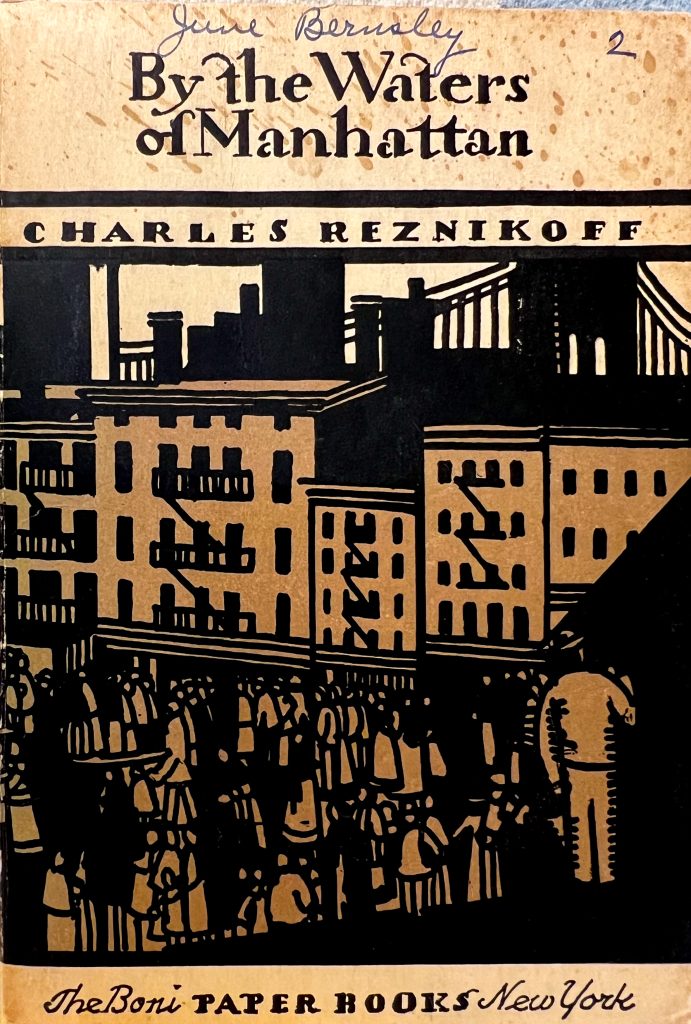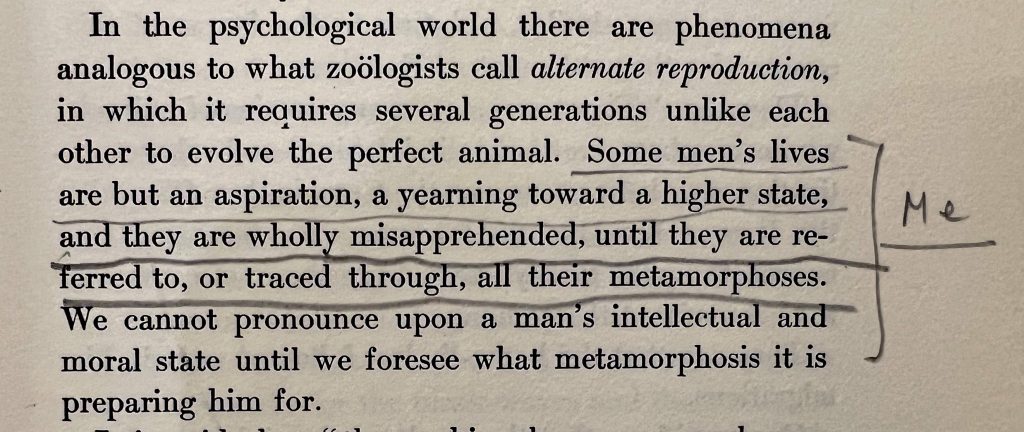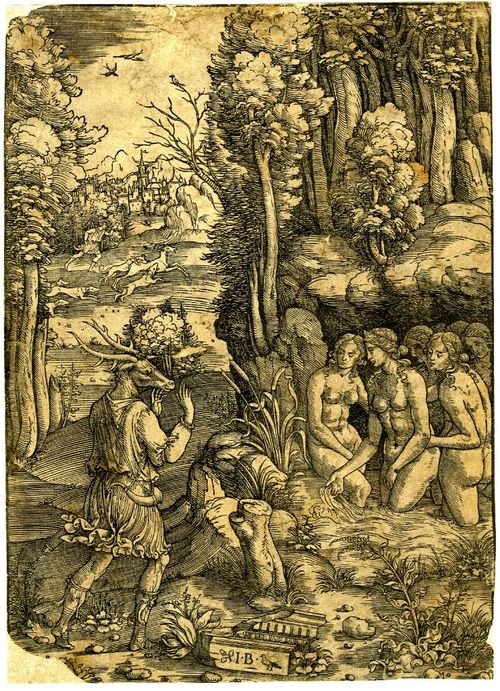
[After reading the poem, click on any verse to unroll an annotation. (Click again to hide it.)]
A Palinode
by Edmund Bolton
In a palinode, one takes a statement back. Literally, one sings it back—sings it away. The term combines the Greek words πάλιν (pálin), meaning “back” or “again,” and ᾠδή (ōdḗ), meaning “song.” This poem, first published in Englands Helicon, one of the greatest anthologies of lyric poetry in English, in 1600, seems to have been written by a man named Edmund Bolton; his initials appeared at the end. What might he have been trying to take back? Unfortunately, not much is known about him. He only left half a dozen poems in English, plus a few in Latin. The Oxford Dictionary of National Biography calls him a philologist, that is, someone who likes to investigate the history of words. That’s evident in another of the poems he contributed to Englands Helicon, “Theorello,” where he riffs on the ability of the Greek word κόσμος (kósmos) to mean both “the world” (as in the English word cosmos) and “an ornament” (as in cosmetics). The Oxford DNB also says that Bolton was a Catholic, for which he was persecuted; that he was educated at Trinity Hall, Cambridge; that he never had much money; and that his great ambition was to write history. He published a book about heraldry in 1610 and a biography of Nero in 1624, and at his death left behind a manuscript, titled “Hypercritica,” about the need for historians to test the claims of chroniclers against surviving documents. In the year 1600, however, he probably hadn’t even conceived of these books, let alone written or published them. He was only twenty-five years old.
As withereth the primrose by the river,
As fadeth summer’s sun from gliding fountains,
As vanisheth the light-blown bubble ever,
As melteth snow upon the mossy mountains,
Maybe in Bolton’s palinode it’s beauty that’s being taken back? Bolton begins his poems with an epic simile, or rather with four epic similes, each of which makes a comparison to an emblem of beauty—a primrose, sunlight, a bubble, and snow—each of which, in turn, is subject to loss. A gentle loss, in each case, appropriate to the beauty in question and somehow almost a testament to it. Because a primrose blooms in spring, because the sun is named as summer’s, and because snow belongs to winter, the emblems, and their passing, call to mind the succession of the seasons. The fragility of beauty, in other words, is from the poem’s outset associated with the work of time. The number four, by the way, is key to the structure of Bolton’s poem, which has the form of a double sonnet.
After four beauties in the first four lines, the fifth line insists four times on the loss of them, reversing the order of the verbs previously used to describe their loss. Bolton manages to stay in meter by taking advantage of his era’s open-mindedness about whether the third person singular of a verb ends in -s or -eth.
The rose, the shine, the bubble, and the snow
In line 6, the emblems of beauty return, in their original order, as if Bolton is briefly restoring what time had taken.
Of praise, pomp, glory, joy (which short life gathers)—
Only in line 7 does the reader finally discover that the four similes describe not one but four things. Because Bolton is so careful about order, it seems likely that he means to describe praise as like a primrose, pomp as like sunshine, glory as like a bubble, and joy as like mountain snow.
Fair praise, vain pomp, sweet glory, brittle joy.
Bolton repeats himself in line 8, perhaps to give the reader a moment to breathe—to recover from the complexity of his four-part conceit. But look at the adjectives he has added: fair and sweet have a positive valence, but vain and brittle a negative one. A small variation has been introduced into the symmetry of the poem.
The withered primrose by the mourning river,
The faded summer’s sun from weeping fountains,
The light-blown bubble, vanished forever,
The molten snow upon the naked mountains
Bolton now repeats all four similes, in preparation for making an argument about what they reveal about their objects. Note that he goes byond merely rhyming the third quatrain with the first. Instead he re-uses all four of the first quatrain’s rhyme-words, as if to emphasize, by these samenesses, a difference: previously he had described the emblems of beauty as going; now they are gone. The river is in mourning; the fountains are weeping.
Are emblems that the treasures we up-lay
Soon wither, vanish, fade, and melt away.
According to the orthodox Christian deprecation, the rewards of this world are worthless because they won’t last. “Lay not up for yourselves treasures upon earth, where moth and rust doth corrupt, and where thieves break through and steal,” counseled Jesus (Matthew 6:19 [KJV]). Thisworldly praise and glory, Bolton’s similes maintain, are as ephemeral as thisworldly beauty. Are they what Bolton is giving up? Bolton’s imagery is in tension with his ostensible moral here. People do sometimes hope that textiles and metals will last in storage, but Bolton hasn’t mentioned any such treasures, and I’m not sure anyone has that hope about flowers or summer light. Note that in line 14, the last line in the first stanza, Bolton has braided his verbs in a new order, signaling a complication, or at least an interest in complicating. Note also that Bolton hasn’t said anything about the brevity of beauty’s lifespan here below that is likely to make the beauty any less appealing.
The emblem that comes last in the first stanza of the poem comes first in the second.
For as the snow, whose lawn did overspread
Th’ambitious hills, which giant-like did threat
To pierce the heaven with their aspiring head,
Naked and bare doth leave their craggy seat;
The snow now appears in a new aspect. No longer merely an object to be lost, it is now an actor; the snow is leaving. There’s almost a hint, too, that it’s leaving after a relationship with its mountain that turned out to be difficult. The mountain, ambitious and aspiring, seems to have had an angry way of being in the world.
Whenas the bubble, which did empty fly
The dalliance of the undiscerned wind,
On whose calm rolling waves it did rely,
Hath shipwreck made, where it did dalliance find;
From snow, the element that came fourth in the first stanza, Bolton moves backward to the bubble, which came third there. The bubble, too, now seems to be acting rather than suffering its fate: it flies the wind (in which there seems, again, to be the suggestion of an unreliable partner, whose failing in this case is fickleness), and it makes its shipwreck. To construe these suggestions of active losing and of previous relationships, a reader has to bring to the poem her own sensibility and experience. I think I hear the possibility that the sensual beauty of this world, like the social rewards we find in it, doesn’t exist independent of our perceiving but is created, to some extent, by the need in us that calls for it, and isn’t lost merely in the forward motion of history, but is lived through—enjoyed through the same process that exhausts it.
And when the sunshine, which dissolved the snow,
Four: snow. Three: bubble. Two: sunshine. Next should come the primrose, but instead Bolton has jumped back to snow, his fourth element. And not only has the poem veered out of sequence. For the first time, the relation between the elements isn’t mere juxtaposition. There’s cause and effect. The sun melted the snow.
Colored the bubble with a pleasant vary,
And made the rathe and timely primrose grow,
It melted the snow, it colored the bubble, and it grew the primrose. A vary, by the way, is a variation, and rathe means “early” (another way of saying you would sooner do A than B is to say that you would rather do A than B). The beauties that exist in the world, it turns out, cause one other as well as give way to one other—the way seasons do.
Swarth clouds withdraw (which longer time do tarry);
I’ve made a small emendation to line 26. As originally printed in Englands Helicon, its beginning reads, “Swarth clowdes with-drawne.” I’ve emended with-drawne to withdraw. Instead of the subject-verb-object order usual in English sentences (the cat eats the mouse), Bolton has gone with the less-common but not unheard-of object-subject-verb order (the mouse the cat eats). I suspect that this confused the typesetter, who mistakenly tried to “correct” it. In other words, I think Bolton originally wrote, “And when the sunshine . . . / Swarth clouds withdraw,” meaning, roughly, And when swarthy clouds withdraw the sunshine . . .
The second stanza up to this point (lines 15 through 26) attempts to introduce a new epic simile, intended to answer the four similes of the first stanza. As snow leaves hills, as a bubble makes its shipwreck, and as sunshine, when clouds withdraw it . . . The clouds, by the way, having obscured the sunshine, tarry for a longer time than the sunshine did, the persona of Bolton’s poem observes parenthetically—
—and in the middle of his thought loses track of where he was in his own sentence. Bolton’s speaker breaks off—the term of art is aposiopesis, as the philologist Bolton no doubt knew—as if so frustrated by the difficulty of what he’s trying to say that he needs to give up and tackle it again from a less poetical angle.
Oh, what is praise, pomp, glory, joy, but so
As shine by fountains, bubbles, flowers, or snow?
After all, he seems to fall back to saying, there’s nothing to compare the rewards of this world to other than what he has already compared them to. It’s as if, having lived in his similes long enough, so long that he has discovered in them a new aspect of action and a new context of relationship, it no longer seems likely to Bolton that anyone will confuse perdurability with value. A thing isn’t less meaningful because it doesn’t last. How could we think so? Neither we, beauty, nor the relationships in which we find ourselves and beauty are going to survive. He recants recantation.
Sources: The Oxford Dictionary of National Biography, Bolton’s “Theorello,” Bolton’s “Hypercritica,”, the text of “A Palinode” as printed in Englands Helicon.




